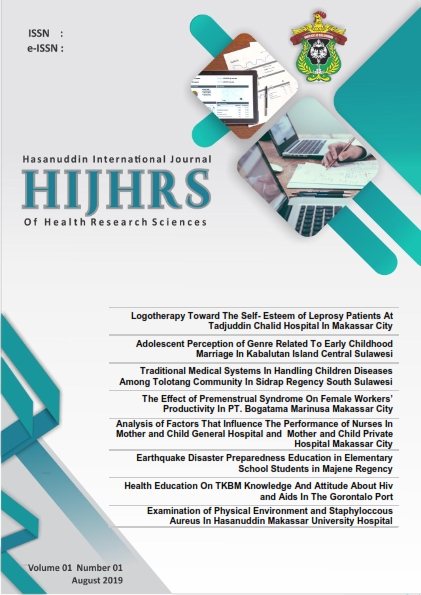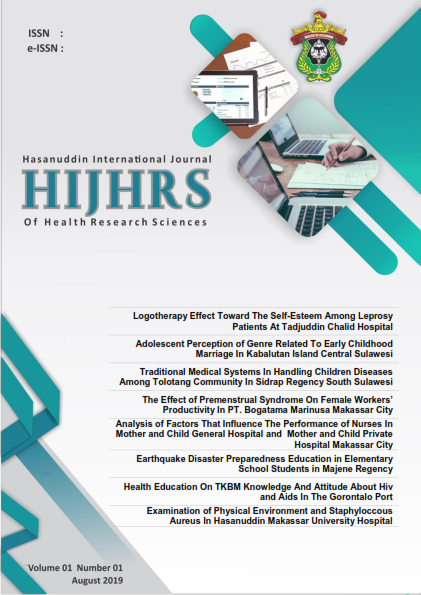Adolescent Perception of Genre Related to Early Childhood Marriage In Kabalutan Island Central Sulawesi
Abstrak
Adolescent perceptions of early childhood marriage are responded positively or negatively because of the high sexual urges of teenagers because of permissive and almost unlimited environmental influences. The Planning Generation Program (GENRE) which is focused on adolescents is expected to be an innovative solution for the community, especially families with teenagers. This study aims to analyze the perceptions of adolescents about the acceptance of the GENRE concept related to early childhood marriage on Kabalutan Island. This research is a qualitative research with an explanatory approach. Data collection was conducted with Focus Group Discussions and in-depth interviews as well as observations on 14 informants consisting of teenagers who were early marriages and not early marriages, parents of teenagers who had married early and parents of unmarried teenagers and local community leaders consisting of officers health and teachers. To obtain the factors that drive teenagers' perceptions, the data are analyzed using taxonomic analysis. This study has succeeded in identifying the perceptions of adolescents about GENRE and early childhood marriages on the island of Kabalutan. The family environment and socio-culture of the local community and the interventions provided by some Parties provide a diverse understanding of adolescents. Therefore, it is recommended for cross-sector stakeholders who are interested in equating perceptions and joint interventions so that the acceptance of GENRE can be maximized in overcoming early marriage.
Keywords: Acceptance, Concept, Marriage, Behavior, Adolescents
Referensi
Arie., Ismail. & Emilia. (2011). Akseptabilitas dan Pemanfaatan Pusat Informasi dan Konsultasi Kesehatan Reproduksi Remaja pada Siswa Sekolah Menengah Umum. Berita Kedokteran Masyarakat, 27(3):160−168.
Arimurti. & Nurmala. (2017). Analisis Pengetahuan Perempuan Terhadap Perilaku Melakukan Pernikahan Usia Dini di Kecamatan Wonosari Kabupaten Bondowoso. The Indonesian Journal Of Public Health, 12(2): 249−262.
Audina., Winarni., Dharminto. & Mawarni. (2016). Hubungan Persepsi Penerapan Fungsi Keluarga dengan Pernikahan Usia Dini pada Wanita Usia Subur di Kecamatan Pracimantoro, Kabupaten Wonogiri Jurnal Kesehatan Masyarakat, 5(4):172−179.
Badan Pemberdayaan Perempuan dan Keluarga Berencana. (2017). Laporan Yearan Rekapitulasi Seksi Pemberdayaan Ketahanan Keluarga, Balita, Anak Remaja dan Lasia Year. Jakarta : Badan Pemberdayaan Perempuan dan Keluarga Berencana.
Badan Pusat Statistik dan United Nations ICEF. (2016). Kemajuan yang tertunda : Analisis Data Perkawinan Usia Anak di Indonesia, Katalog BPS : 4103014. Jakarta : Badan Pemberdayaan Perempuan dan Keluarga Berencana.
Lianawati., Dermatoto. & Adriani. (2018). Parental Komunikasi,
rekan Peran, dan Kontekstual yang Pengaruh Sekolah pada Perilaku Seks Aman antara Remaja di Mojokerto, Jawa Timur. Jurnal Promosi Kesehatan dan Perilaku, 3(2):94−99.
Follona., Raksanagara. & Purwara. (2014). Perbedaan Pendidikan Kelompok Sebaya tentang Pendewasaan Usia Perkawinan di Perkotaan dan Perdesaan. Jurnal Kesehatan Masyarakat Nasional, 9(2):157−163.
Hidayatullah., Putri., Naotrue., Riswanda. & Fedryansyah. (2018). Persepsi dan Pemberdayaan Gender (Studi Kasus Desa Pancawati Kecamatan Caringin Kab. Bogor Sosiologo Global: Jurnal Pemikiran dan Penelitian Sosiologi, 3(1):1−16.
Landung., Thaha. & Abdullah. (2009). Studi Kasus Kebiasaan Pernikahan Usia Dini Pada Masyarakat Kecamatan Sanggalangi Kabupaten Tana Toraja. Jurnal MKMI, 5(4):89-94.
Raj. (2009). When the mother is a child : the impact of child marriage on health and human rights of girls Archives of Disease in Childhood, 95(11):931-935.
Rohmayanti., Rachman. & Nisman. (2015). Pelayanan Kesehatan Peduli Remaja menurut Perspektif Remaja di Kota Magelang. Jurnal Kesehatan Reproduksi. 2(1): 12−20.
Tsany. (2012). Trend Pernikahan Dini di Kalangan Remaja (Studi Kasus Di Kabupaten Gunung Kidul Yogyakarta Year 2009 - 2012). Jurnal Ilmiah Sosiologi Agama, 9(1):83−103.
United Nations Children’s Fund (UNICEF). (2005). Life Skills Based Education in South Asia. In a Regional Overview Prepared for : The South Asia Life Skills−Based Education Forum. Nepal: United Nations Children’s Fund.
Yulianti. (2017). Program Genarasi Berencana (GenRe) dalam rangka Pembangunan Manusia Menuju Pembangunan Nasional Berkualitas. Jurnal Analisis Sosial Politik, 1(2):93−108.
Unduhan
Diterbitkan
Terbitan
Bagian
Lisensi



